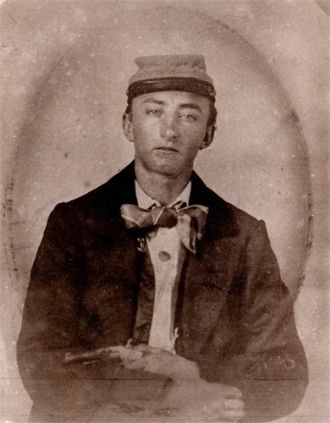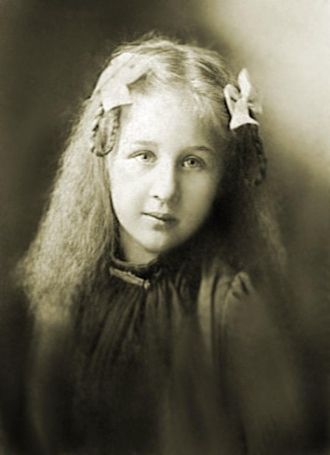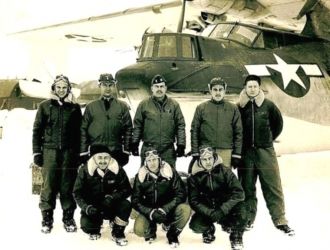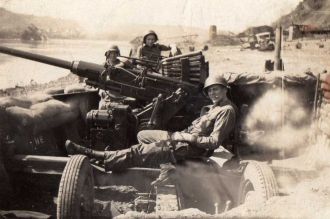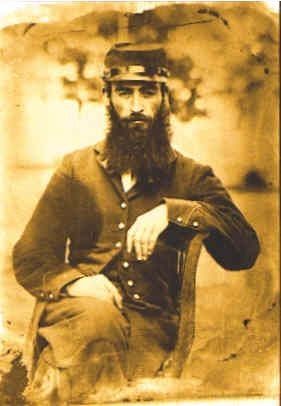John Henry Friday
A photo of my great-grandfather, John Henry Friday, who fought with the 8th Regiment Ohio Cavalry. He was seriously wounded in Virginia and spent time incarcerated in the infamous Andersonville Prison. He later homesteaded in Nebraska. For a story about his life-go to pixleyblair.tribalpages.com scrolling to the bottom of the homepage to 'Stories'. Click on: 'John Henry Friday-Soldier, Prisoner, Pioneer' A copy of this photo - which was probably done at the time of his enlistment in 1861 - was sent to what is now Andersonville National Park for their archives.
(A small portion of his story if you click the link: He was captured and incarcerated for about 8 months in Andersonville Prison in Georgia and he was exchanged just before the end of the war. According to wikipedia the 8th Regiment Ohio Cavalry..."served primarily in West Virginia and the Shenandoah Valley of Virginia..." According to most government documents, John Henry was "Captured in action in Liberty , Va. June 19/64 admitted to the Hospital at Andersonville, Ga., treated for diarrhea and returned to
prison quarter Nov 11/64. Sent to Savannah, Ga. Nov 15/64 where he was paroled Nov 20/64 and sent to Camp Parole, Md. Nov 27/64 where he reported and was furloughed for 30 days. Return
date not stated and sent to U.S. Genl Hospital, Annapolis, Md. Febr. 1865." Camp Parole was built outside Annapolis where Union prisoners paroled from Confederate prisons could get a bath, a shave, fresh clothing and, if needed, medical attention. They would then
either be sent home or join their regiments.
Disability for Discharge papers dated June 19, 1865-describe him as "unfit to perform
his duties of a soldier because of a Gunshot Fracture of the left tibia and fibula causing ulceration of the anterior muscle of the leg". The document Declaration -- Invalid Pension State of Ohio, County of Franklin July 1865 states that "he was engaged with his company and regiment
(Co. 'G' 8th Ohio Cavalry) in Battle with the Rebel forces & that while so engaged he was wounded by a gunshot which struck him in the left leg about halfway between the knee and ankle, the ball passing entirely through the said leg, fracturing both bones of the same-that by reason of said wound he is almost totally disabled." That after being wounded, he was first taken to the Rebel Post Hospital in Liberty, Virginia-having been taken Prisoner by the said Rebel forces, in different Prisons until the 20th of November 1864." Therefore, John Henry was wounded and taken prisoner at or near Liberty, Virginia. Located between Lynchburg and Roanoke. (The town was renamed Bedford in the 1890s.)
John Henry's gravestone in the cemetery in Fairbury, Nebraska-has a marker noting his Civil War service.
(A small portion of his story if you click the link: He was captured and incarcerated for about 8 months in Andersonville Prison in Georgia and he was exchanged just before the end of the war. According to wikipedia the 8th Regiment Ohio Cavalry..."served primarily in West Virginia and the Shenandoah Valley of Virginia..." According to most government documents, John Henry was "Captured in action in Liberty , Va. June 19/64 admitted to the Hospital at Andersonville, Ga., treated for diarrhea and returned to
prison quarter Nov 11/64. Sent to Savannah, Ga. Nov 15/64 where he was paroled Nov 20/64 and sent to Camp Parole, Md. Nov 27/64 where he reported and was furloughed for 30 days. Return
date not stated and sent to U.S. Genl Hospital, Annapolis, Md. Febr. 1865." Camp Parole was built outside Annapolis where Union prisoners paroled from Confederate prisons could get a bath, a shave, fresh clothing and, if needed, medical attention. They would then
either be sent home or join their regiments.
Disability for Discharge papers dated June 19, 1865-describe him as "unfit to perform
his duties of a soldier because of a Gunshot Fracture of the left tibia and fibula causing ulceration of the anterior muscle of the leg". The document Declaration -- Invalid Pension State of Ohio, County of Franklin July 1865 states that "he was engaged with his company and regiment
(Co. 'G' 8th Ohio Cavalry) in Battle with the Rebel forces & that while so engaged he was wounded by a gunshot which struck him in the left leg about halfway between the knee and ankle, the ball passing entirely through the said leg, fracturing both bones of the same-that by reason of said wound he is almost totally disabled." That after being wounded, he was first taken to the Rebel Post Hospital in Liberty, Virginia-having been taken Prisoner by the said Rebel forces, in different Prisons until the 20th of November 1864." Therefore, John Henry was wounded and taken prisoner at or near Liberty, Virginia. Located between Lynchburg and Roanoke. (The town was renamed Bedford in the 1890s.)
John Henry's gravestone in the cemetery in Fairbury, Nebraska-has a marker noting his Civil War service.
Date & Place:
Not specified or unknown.

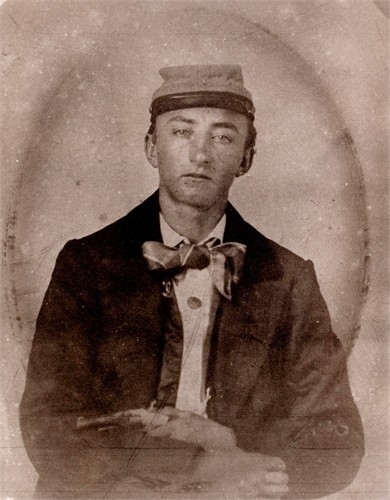
 Barbara Pixley
Barbara Pixley  AncientFaces
AncientFaces  KellieAnne Foreman
KellieAnne Foreman  Kate Van Dyck
Kate Van Dyck  Nola Rains
Nola Rains  Brigitte Cherubini
Brigitte Cherubini  Denise Fiorina-Brzezinski
Denise Fiorina-Brzezinski  Cari Urbanczyk
Cari Urbanczyk  Liz Cain
Liz Cain 
